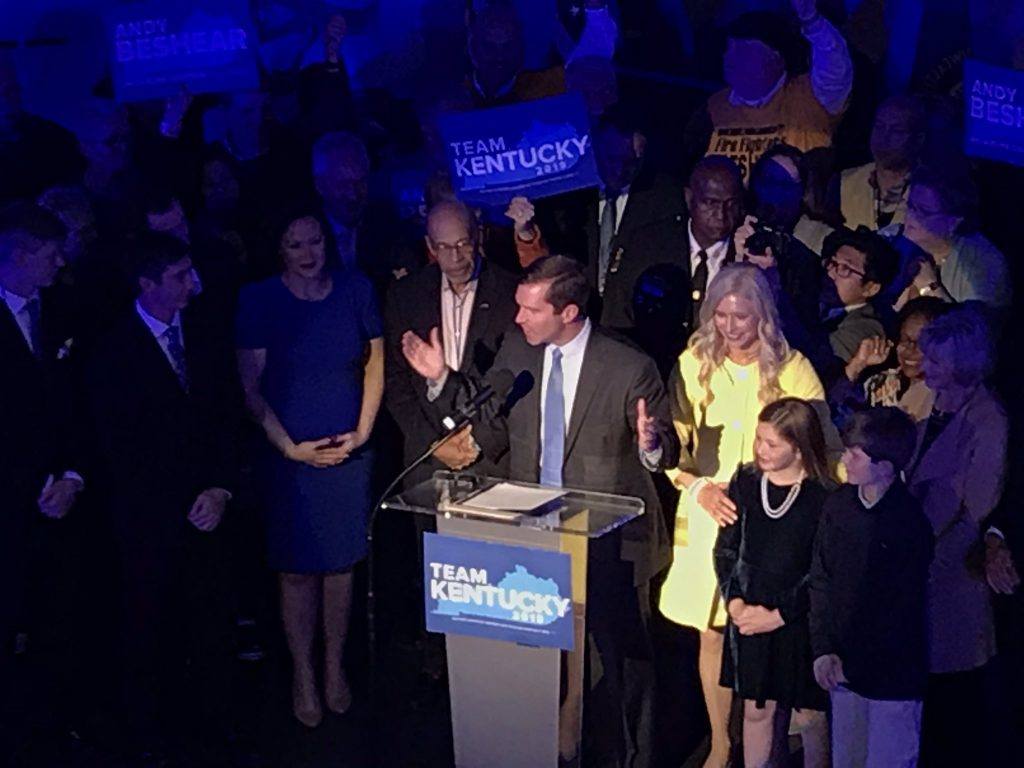[ad_1]
Andy Beshear, Kentucky Democratic candidate for governor and an ardent supporter of expanded gaming, claimed victory in Tuesday’s election as state election data showed he held a 5,189-vote lead over Gov. Matt Bevin, the Republican incumbent.

Andy Beshear, the apparent winner of Kentucky’s gubernatorial election, speaks to his supporters during an Election Night results watching party in Louisville. With all preceincts reporting, Beshear, a Democrat, beat Republican Gov. Matt Bevin by nearly 5,200 votes. (Image: Kentucky Democratic Party)
However, Bevin opted not to concede defeat on Tuesday night, meaning the race would likely go to a recanvass or a possible recount.
With all 3,659 precincts reporting from the state’s 120 counties, Beshear, the sitting Attorney General, received 709,577 votes to Bevin’s 704,388. That works out to a difference of about 1.4 votes per precinct.
The race was expected to be close, with a Mason-Dixon poll showing the two candidates tied at 46 percent last month. However, on PredictIt, a political betting exchange site, shares for the Democratic Party winning the race were selling for a little as 30 cents on Monday, compared to 72 cents for the Republicans.
As of Monday night, Democratic shares were selling for as much as 96 cents.
In briefs remarks to the crowd watching returns at the campaign’s viewing party in Louisville, Beshear didn’t bring up gambling, but he thanked the teachers, law enforcement and other public unions that endorsed him and provided volunteers. Beshear has touted expanded gaming, including bringing casinos to the state, as a way to bridge the gap in pension funding for those state workers.
We will be ready for that first day in office, and I look forward to it,” the apparent governor-elect told onlookers.
Per the state constitution, Beshear and Jacqueline Coleman are to be sworn into office on Dec. 10.
Beshear’s Plan
During the campaign, Beshear and Bevin debated the topic of expanded gaming.
Beshear argued that the state has been losing millions of dollars in tax revenue to neighboring states, such as Illinois, Indiana, and Ohio. All of those states have casinos directly across the Ohio River from Kentucky cities. In addition, neighboring West Virginia offers casino gaming, while Virginia’s legislature is considering allowing casino in the state. Tennessee, earlier this year, approved sports betting.
Beshear also made the legalization of sports betting in Indiana an issue in the campaign, adding that it would take additional money away from the state. In his plan to expand gaming, Beshear has called for the state to allow casino gambling, online gambling, sports betting, fantasy sports, and potentially online poker. He is pushing a plan that would create no more than 10 casinos statewide.
While Kentucky does not have any commercial or tribal casinos, four of its racetracks operate historical horse racing (HHR) machine parlors. The HHR machines look like slot machines. However, their payouts are based on the outcomes of previously run races. Bettors make wagers based on those races and are given just basic information about the race. Like traditional horse racing, HHR is considered a pari-mutuel betting opportunity.
Opposition in the Legislature
Bevin, who enjoyed support from Evangelical voters and other social conservatives, railed against casino gaming, saying that the tax revenue generated would not be nearly enough to address the state’s underfunded pension programs.
He also told a radio reporter that casino gaming comes at a heavy social cost and claimed that people commit suicide daily in casinos. Bevin denied making that claim in a debate with Beshear, despite the fact that the recording was still on the radio program’s website.
Beshear’s victory doesn’t necessarily mean gaming will be pushed through the legislature. Currently, the Republicans control both houses and hold a supermajority in the state Senate. During the campaign, Senate GOP leaders said any bills that involve casino gaming, would not pass their chamber.
It remains probable, however, that the General Assembly will take up some type of expanded gaming legislation when lawmakers convene in January. Legislation to legalize sports betting failed to pass the House last year, but its proponents have been optimistic about its chances in the upcoming session.
[ad_2]
Source link


